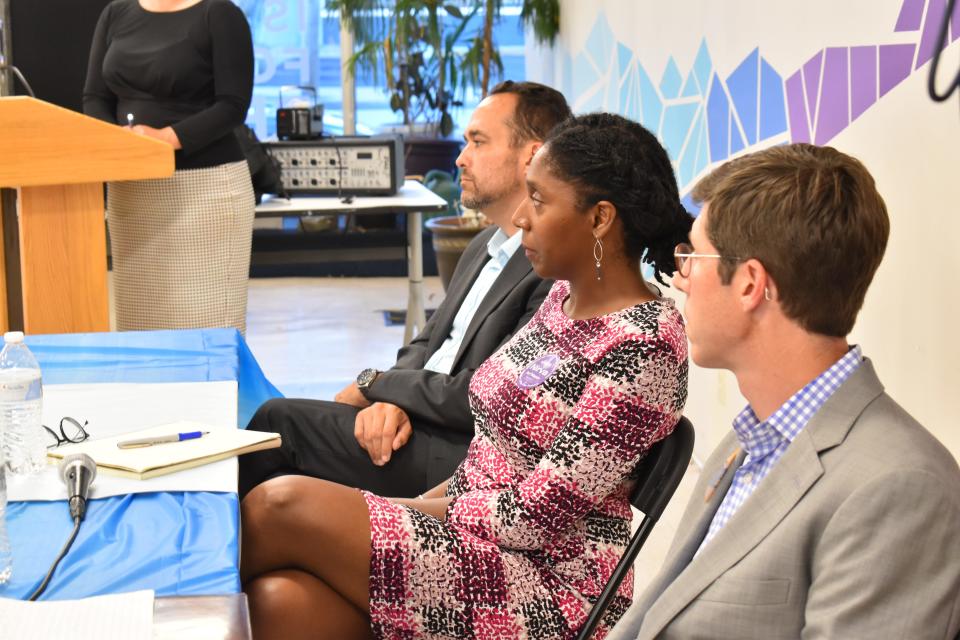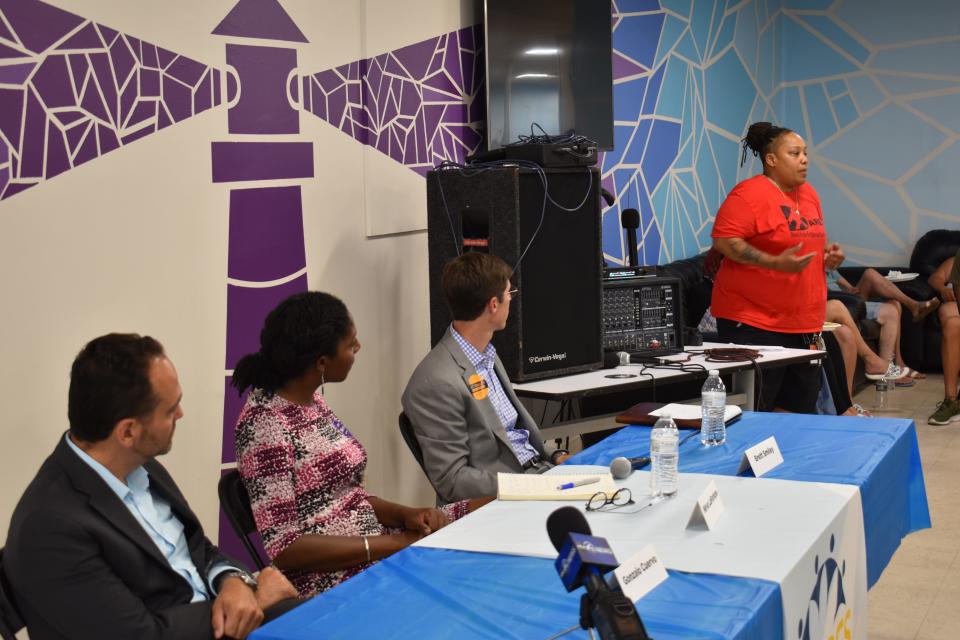Providence mayoral candidates face tough questions on addiction and recovery issues
PROVIDENCE – Mayoral candidates got their first major chance to tell voters how they would address addiction and recovery issues as the state continues to struggle with an opioid crisis.
On Thursday, more than 100 people attended a forum at the Anchor Recovery Center moderated by NBC 10's Alison Bologna, though individuals in recovery were able to pose tough questions of their own to the candidates about supporting their community.

'There's no housing'
Katie Pariser, a peer recovery specialist at Sojourner House and Parent Support Network of RI, described finding herself homeless while dealing with addiction, entering recovery housing and emerging only to struggle to find permanent housing.
"Some of my really good friends are still in recovery houses and they have nowhere to go, so they're there, and some are safe, but not in their own place, and they're ready to leave, and they're ready to find housing, and there's no housing," Pariser said.
She wondered what candidates would do to fix that.
Brett Smiley
"Housing is health care and housing is critical to sustaining recovery," said Brett Smiley, who drew from his experience in long-term recovery from alcohol addiction. Smiley emphasized a "need to work through community partners" such as Amos House to create more recovery housing, including making use of vacant and abandoned property.
Smiley criticized what he said is a tendency in the city to build "apartments for rich college kids" instead of families, and he spoke of the importance of down-payment assistance and help for first-time homebuyers.
Gonzalo Cuervo
Gonzalo Cuervo said the city already has the resources it needs to act through the Providence Housing Authority, the Providence Redevelopment Agency, the city planning department and "the power of zoning that we can change, that we have to change."
"We’re in an excellent spot," Cuervo said. "We just need to pull the trigger and move forward."
Nirva LaFortune
"Not only is housing health care, housing is a human right." said City Councilwoman Nirva LaFortune, who spoke about her time on the council helping to create a housing trust fund and allocating American Rescue Plan Act dollars, many of which went to housing. LaFortune also reminded voters of her plans to redesign North Main Street – a massive project idea that could include a housing element – though it remains in its early stages.

Longstanding barriers to normal life
Tarah Dorsey, a court support navigator at Project Weber/RENEW, a local nonprofit agency focused on recovery, reflected on the story of a friend who faced three drug charges. Dorsey explained that the third, which rose to the level of a felony, came less than a year ago from possession of drug residue. Dorsey said the charge has impacted her friend's ability to find housing help through RIHousing, which typically requires a minimum of five years without criminal activity to receive assistance. Dorsey said her friend, who is living in a hotel and commuting to work each day on public transit, has been in recovery for nearly a year.
Dorsey wondered whether mayoral candidates could change the rules.
'A crisis': Record number of Rhode Islanders died from accidental drug overdoses in 2021
Fatal overdoses: State's new drug overdose data hub offers grim picture of addiction
Smiley said the RIHousing board, which is appointed by the governor, would need to change its policies but that "the mayor, in order to be effective, needs to have a working relationship with the governor to be able to speak with conviction on issues that are important."
Smiley added that "this is where we need a mayor who understands, who's willing to be an advocate, who's willing to use the power of the office to fight for policy changes."
LaFortune said that community members should be involved in the decision-making as it relates to RIHousing, and that barriers to housing needed to be broken.
Cuervo noted that criminal records are also an issue, claiming that "the mayor has significant authority and control over the way misdemeanors are charged and prosecuted by the police."
Cuervo contended that Dorsey's friend should never have faced a third charge.
Police interactions in question
In a final question, Dorsey raised criticism over police interactions with people suffering from addiction, concerned over how often police use naloxone, an opioid overdose reversal drug also known as NARCAN, when witnessing an overdose.
In 2014, Providence police devised their NARCAN policy, equipping and training more than 350 officers.
"We should not be criminalizing anyone who suffering from a behavioral health disorder," LaFortune said, contending that "there needs to be some additional training within public safety," but she did not connect that specifically to drug overdoses.
LaFortune added that police need to approach their work "from a diversity, equity and inclusion lens."
Opioid settlement: $2.25M dedicated to help RI create safe drug consumption site
Violent crime: What does the Nonviolence Institute’s partnership with police entail? A lot.
Cuervo said the city needs to expand its non-police intervention options, which currently include enlisting the help of social workers in responding to emergencies.
Cuervo also advocated for more community policing to develop "more personal interactions, more empathy, more human-level connections."
Smiley, who during the forum vowed to ensure that individuals in recovery are placed in senior leadership roles, said police training "needs to include a component around recovery" not only in the academy but continuously.
Mayor Elorza: Want to be the next mayor of Providence? Prepare to be 'attacked from every angle'
This article originally appeared on The Providence Journal: Providence mayoral candidates face questions on addiction, housing

